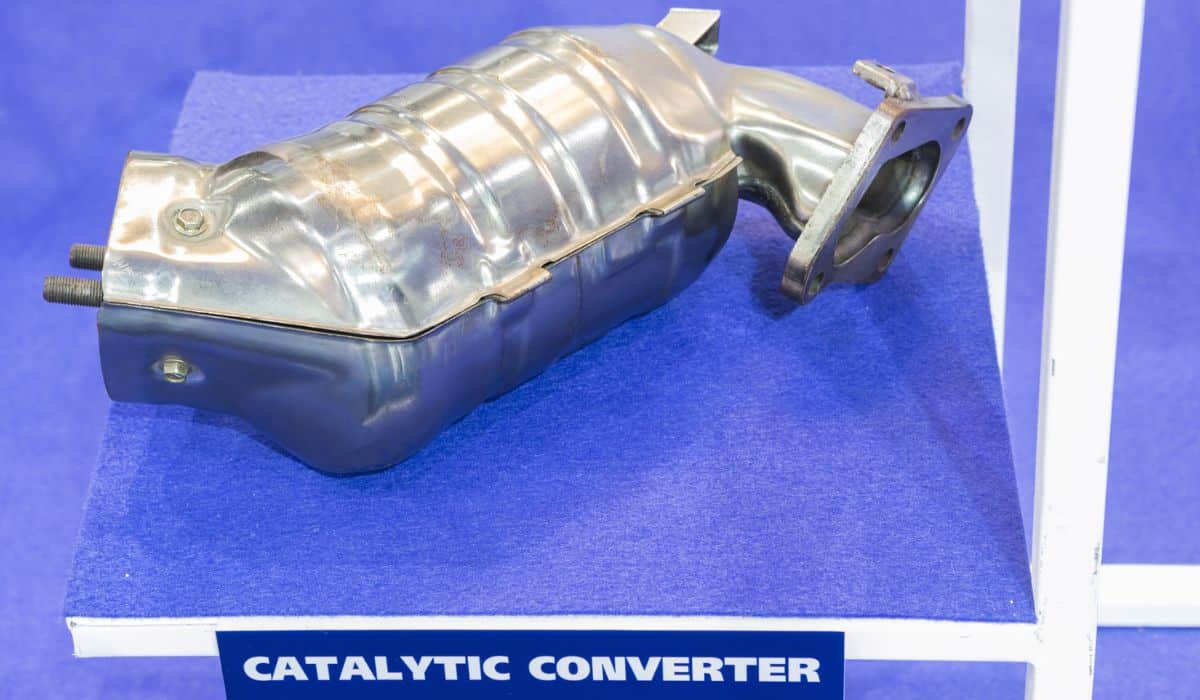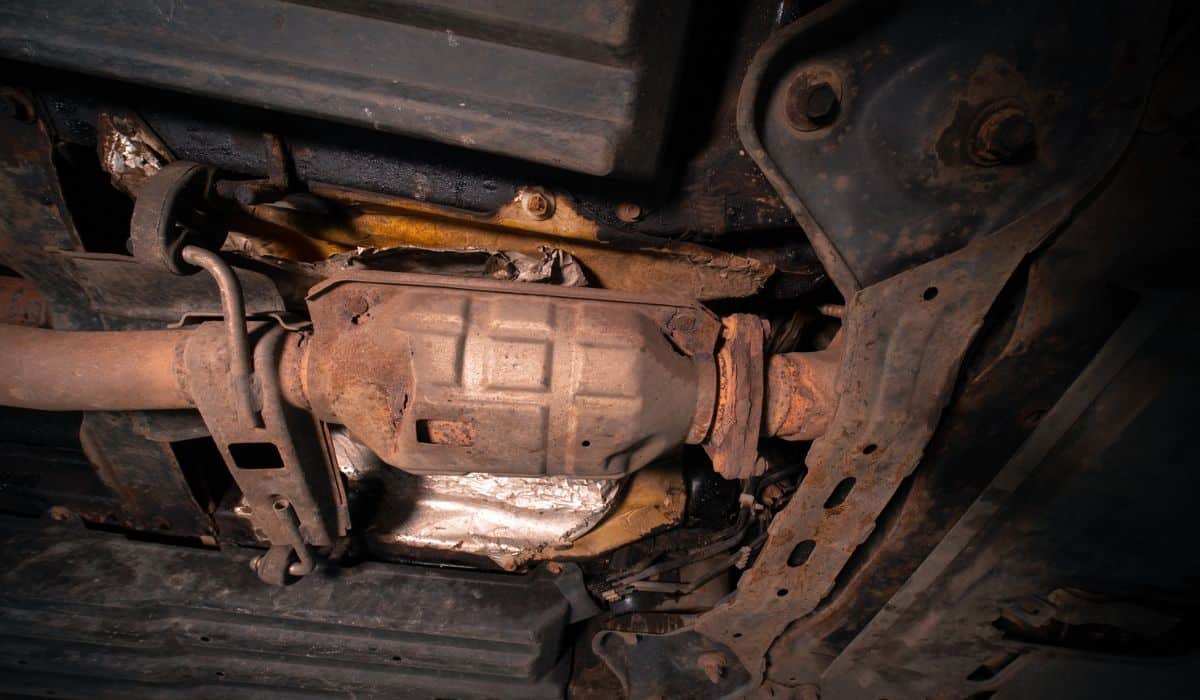Does a Catalytic Converter Reduce Exhaust Smell?
The catalytic converter is an integral component of combustion engines. It converts harmful chemicals and exhaust particles into less dangerous fumes. But can this component reduce the smelliness of exhaust?

A catalytic converter does make exhaust less smelly. Its components convert hydrogen sulfide from gasoline into sulfur dioxide, which is odorless. If it isn’t working properly, you might notice a rotten egg or sulfur smell. Other signs of problems include performance drops and dark exhaust smoke.
Catalytic converters not only serve an important purpose in protecting the environment, but help make the smell of exhaust less noticeable. If you’re dealing with exhaust that’s especially unpleasant, there’s likely a problem with your catalytic converter. Let’s take a look at how catalytic converters work and some telltale signs of malfunction.
What Do Catalytic Converters Do?
Combustion engines release harmful emissions, like carbon dioxide, that aren’t safe for humans or the environment. Catalytic converters are integral components of modern-day combustion engines, as they filter exhaust gasses and harmful particles.
Catalytic converters look like large metal boxes on the underside of a vehicle. The design includes two pipes and stages. The catalytic converter uses two pipes and stages to make exhaust fumes safer for the environment.
Gasses come from the “input” pipe attached to the engine. These fumes move through the different stages and leave out the “output” pipe linked to the vehicle’s exhaust pipe.
Each stage has a honeycomb-like design constructed from a platinum alloy. The first part is typically platinum-rhodium, while the second uses a platinum-palladium design.
The harmful gasses flow through the honeycomb structure, and atom bonds break apart into nitrogen and oxygen — which are entirely harmless for the earth and humans.

Does a Catalytic Converter Reduce Exhaust Smell?
Yes, catalytic converters can reduce the smell of exhaust fumes.
When it’s functioning correctly, a catalytic converter’s components convert hydrogen sulfide from the gasoline into sulfur dioxide, which is odorless. However, if the catalytic converter isn’t working, you might notice a rotten egg-like sulfur aroma from the tailpipe.
The nasty smell from a faulty converter comes from unburnt fuel, and you may notice darker-colored smoke leaving the exhaust pipe. These indicate a problem with your converter.
What Are the Symptoms of a Bad Catalytic Converter?
Catalytic converters encounter issues all the time. They can develop clogs just like any other filter on a vehicle. Clogs and blockages typically occur on higher-mileage cars or older models.
Some tale-tell signs of a faulty catalytic converter include the following:
Learn More: Will A Clogged Catalytic Converter Cause Your Car To Lose Power?
Performance Decreases
Performance drops are some of the first signs of a faulty catalytic converter. Your car might feel slow or sluggish. You might also notice a significant decrease in acceleration.
Smoke Coming Out of the Exhaust
Once the catalytic converter fails, you’ll see dark-colored smoke expelling out of the exhaust pipe. The smell of the exhaust fumes will also change. You might notice a sulfur scent, which is common in failing converters.
Check Engine Light Comes On
The check engine light can display if the catalytic converter starts to fail. The vehicle’s sensors track gas levels via the exhaust to measure the converter’s efficiency.
Rattling Sounds
A faulty catalytic converter can have loose parts on the inside that rattle around. You might hear sounds from the underside of the vehicle that can worsen over time if the converter is going bad.
Failed Emissions Test
Failing an emissions test can signal that your catalytic converter is going bad. You won’t be able to drive legally if your state requires a passed emissions test.
How to Reduce Exhaust Fumes
The exhaust system is built to convert and release harmful chemicals into less dangerous gasses. As you drive your car, it’ll wear out over time. Fortunately, there are things you can do to extend its lifespan and protect yourself and the environment from harmful exhaust gasses.
Here’s a few maintenance practices worth keeping up with:
Get Regular Oil Changes
Oil ensures your vehicle is lubricated. It keeps the components clean, prevents overheating, and reduces wear and tear.
Regular oil and oil filter changes reduce the chance of burning oil and straining your vehicle’s exhaust system. Old oil or overused filters can cause excessive oil burning and lead to excessive exhaust fumes.
Change the Fuel Filter Frequently
Engines also need clean air and clean fuel to work correctly. The fuel and air filters are essential, as dirt and debris can enter your car at various points. If the fuel filter is outdated and clogged, it can’t clean the fuel and causes issues with the exhaust.
Change the Air Filter Frequently
Air filters in a vehicle help purify the air that enters the engine. Clean air can’t enter the engine as quickly when the air filter is dirty or blocked. Your vehicle will typically use more gas to run smoothly, leading to increased exhaust fumes.
Suggested Articles:
- New catalytic converter break-in period
- Can An Oil Change Affect Your Car’s Catalytic Converter?
- Can Seafoam Clean A Catalytic Converter?
- New catalytic converter smell
- Does catalytic converter affect fuel consumption
- What is the purpose of a catalytic converter?
- Rough Idle: Could A Clogged Catalytic Converter Be The Culprit?
